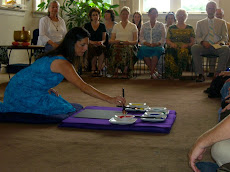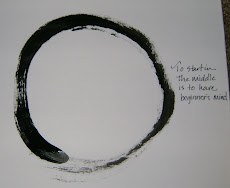I spent I don't know how long writing the following. Perhaps it's in reaction to the media blitz this week on the new government "reforms," which I unlovingly refer to as band-aids - or another way to explain why my thesis is important. However, I'd already written something along these lines, and far-less preachy, awhile back, so I think I'll nix this out of my paper. However, since I have been writing all day long, I figured I'd post it here, and use it - or parts of it - later on, should the need arise.
A small group of thoughtful people could change the world. Indeed, it's the only thing that ever has.
- Margaret Mead
Though “raising standards,” “rewarding excellence and growth,” and “closing achievement gaps” are on the American government’s current education agenda, there is little discussion about how these check list items will truly benefit our children, their teachers, and the world in which they live. Mainstream, public education has ceased to do its job. Budget cuts, coupled with the “No Child Left Behind” Act and the mindset of “teach to the test,” have failed miserably, allowing students to fall through the cracks and teachers to simply crack up.
While math and science seem to be the main thrust of academic focus these days, language arts and history are given a little more than a nod, while the arts and physical education are being cut right and left. Students’ minds are cut off from their bodies and hearts. Critical thinking, depth of inquiry, and a sense of wonder have been strewn by the wayside, in lieu of rote learning, soon to be forgotten once spewed out on a standardized test form.
“Character building” has become a catch phrase, which seems to simply imply, “don’t be a bully,” but still be the biggest, fastest, and strongest kid on the block. “Think for yourself,” has seemed to take on a more “think of yourself” quality – more me and less them, and doing your “personal best” has given way to a “better than” mentality that leads to unfriendly individualized competition, rather than community support.
While alternative education, such as holistic, integrated, and contemplative philosophies and practices are on the rise, the American government and the public at large, have not caught on to, nor have yet embraced these approaches. Fortunately, some teachers do have autonomy and are able to implement different ways of teaching and learning. Even some teachers who are mandated to teach in a cookie-cutter format are able to bring some more out-of-the-box ideas into their classrooms.
There is no one “right way” to learn. There are no perfect pathways to creating cohesion and community. There are no sure-fire tools that work for each and every person that help them gain a full understanding of self, others, the environment, and the greater world. There is no empathy button that one can push to make one more caring and compassionate. And there is certainly no “one kind of teacher,” nor is there just “one kind of student.” Each teacher must search her soul for what path works best for her; be willing to summon the courage to look within and without and know who she is and how she can be of utmost service to herself, others, and the world; and create the best teaching and learning environment that she can.
Lizard Coloring Page
2 years ago





No comments:
Post a Comment